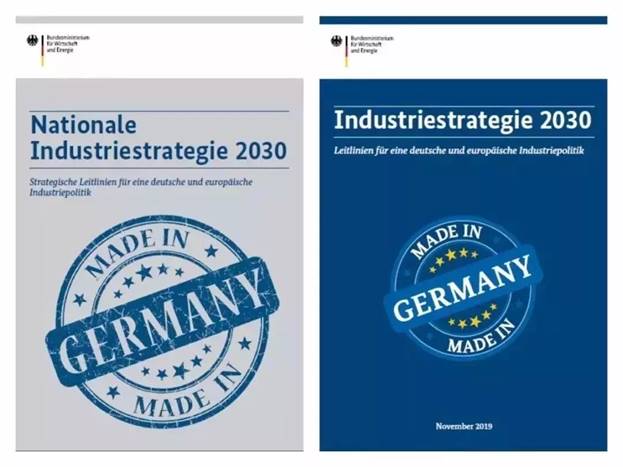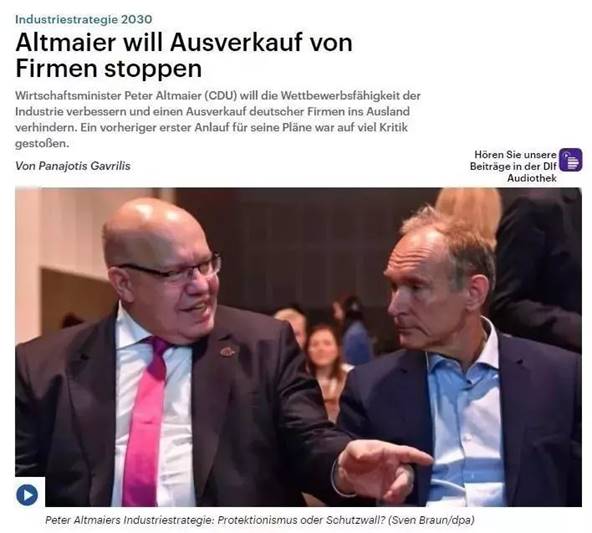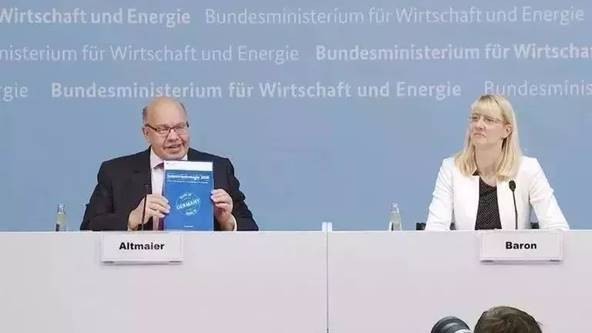After 10 months, what did the final version of Germany's National Industrial Strategy 2030 say?
A few days ago, the German Minister of Economy Peter Altmaier officially released the final revised version of the National Industrial Strategy 2030. The strategy consists of 37 pages and is divided into four parts: industrial policy-the components of the social market economy, policies to improve industrial competitiveness, the components of European industrial policy, and industrial policy dialogue and testing. It involves improving the framework of Germany as an industrial base. Conditions, strengthening the research and development of new technologies, mobilizing private capital, and safeguarding the technological sovereignty of German industry on a global scale. It aims to stabilize and revitalize the German economy and technological level, and maintain the leading position of German industry in European and global competition.

Draft (left) and final version of "Industrial Strategy 2030" (right)
The strategic document specifically mentions that Germany will amend the "Foreign Trade Regulations" to impose stricter requirements on "key technologies" to prevent foreign companies from acquiring German high-tech companies. Some sources said that this is mainly aimed at China and prevent the "KUKA" acquisition from being staged again. However, with the advent of the digital and intelligent era, Germany is facing serious "internal and external troubles".

The biggest ambition of German industry is to expect that by 2030, the proportion of industrial output value can be increased to 25% (currently 22%), and it will account for 20% of the total value-added of the EU's economy. According to relevant data, the added value of German manufacturing accounted for the total value added in the ten years from 2007 to 2017, and the added value of German manufacturing accounted for 23.36% of its total domestic value added in 2017. To increase by 1.64% in the next ten years, it is very difficult for Germany, which is in the "de-industrialization" stage.

China has benefited from cultivating a number of globally competitive high-tech companies such as Huawei, Alibaba, Tencent, and Baidu, and has taken the lead in the fields of 5G, e-commerce and digital payment.
For example, in the field of new energy vehicles, China has taken the lead, and Germany has passively followed. According to data from the Passenger Association, from January to May this year, my country’s cumulative export volume of pure electric passenger vehicles was 78,000, an increase of 172.3% year-on-year. In the past two weeks, the German auto giant Mercedes-Benz and Audi’s parent company each announced layoffs of more than 20,000 people. The German auto manufacturing industry is facing a huge transformation.
In the field of next-generation information and communication technology, China is far ahead in the world. According to statistics from German patent database company IPlytics, Chinese companies currently account for 34% of global 5G standard-essential patent (SEP) applications.

Whether Germany's "Industrial Strategy 2030" can, as they wish, revitalize the German economy and technological level, and maintain the leading position of German industry in European and global competition, still has to be watched.
The following is the main content of Germany's "Industrial Strategy 2030" (translated by Sino-German Businesslink):
1. Industrial policy is an important part of the social market economy
This paragraph describes the characteristics and challenges of German industry. There are:
(1) Small and medium-sized enterprises "hidden champion" and large enterprises are highly interdependent;
(2) Technological innovation triggers a new round of game rules, emerging platform economy, climate protection and energy transition, other countries' implementation of active industrial strategies, threats of trade protectionism, changes in traditional trade relations (such as Brexit), etc.;
(3) Economic and institutional competition from emerging countries (especially China). Therefore, German industrial policy should strive to create a good policy environment and a level playing field for the economic community, and increase the proportion of industrial output value to 25% by 2030. The top ten industries such as the automobile industry, steel, copper and aluminum and other non-ferrous metal industries, chemical and pharmaceutical industries, mechanical equipment and 3D printing, electronic technology and computer communications, optics and medical technology, environmental protection and energy technology, aerospace, marine economy, and national defense security The field is listed as a key high-tech industry.
2. More competitive industrial policies
The German industrial strategy includes three aspects:
(1) Improve the policy environment of German industry. Such as reducing corporate tax burdens, controlling corporate social insurance expenditures, increasing the flexibility of the job market, promoting the training and introduction of professional talents, competitive energy prices, expanding infrastructure, ensuring the supply of raw materials, promoting circular economy, eliminating bureaucracy, Optimize competition regulations, etc.
(2) Strengthen new technologies and promote private capital R&D investment. Such as the promotion of artificial intelligence, digitization, biotechnology, nanotechnology, promotion of small and medium-sized technology enterprises, promotion of venture capital, creation of European independent data infrastructure, and new technology to promote emission reduction. The document mentions that building an independent and trustworthy data infrastructure based on the "Made in Europe" standard is the key. Only by mastering data sovereignty can German and European companies succeed in the digital economy.
(3) Maintain scientific and technological sovereignty. German economic policy will continue to follow the principles of social market economy and support an open global market based on rules and convergent competition conditions worldwide. This applies not only to trade in goods and services, but also to the field of international capital circulation.
The German Federal Ministry of Economics and Energy takes a generally free stance on foreign companies’ equity participation or acquisition of German companies, but it must prevent third-country companies from taking advantage of the openness of the German market to implement threats to German or European public security and order (belonging to the "German Foreign Economic Law" applicable Scope) or the act of technological sovereignty. Therefore, when third-country investors plan to acquire critical infrastructure or military technology companies, the German federal government must increase its review efforts, and more comprehensive reviews should be conducted in sensitive technology areas. Four measures should be taken at the same time, including: 1. More stringent technology transfer conditions; 2. Establish a cooperation mechanism at the EU level, refine audit standards and leave enough room for operation in member states; 3. Sensitive technologies and innovative technologies When there is a risk of loss, the state encourages its own private economy to preferentially acquire; 4. In cases involving the transfer of sensitive or security-related technologies, the German Bank for Reconstruction and Development may act on behalf of the state to purchase shares of companies to be sold and hold them for a certain period of time (referred to as "country Participation options").
3. The cornerstone of European industrial policy
The European Commission should work with all member states to formulate a common EU industrial strategy to ensure the competitiveness of European industries in the future. Germany strongly hopes to formulate a high-level, long-term European industrial strategy that includes specific implementation measures, and will promote the industrial strategy as a key task during the European Commission's rotating presidency in 2020.
The German Federal Ministry of Economics and Energy will pay more attention to the demands of small and medium-sized enterprises, and promote the realization of the comprehensive transformation and implementation of EU laws at the domestic legal level. All EU legislative proposals should "give priority to small and medium-sized enterprises", follow the principle of "small and medium-sized enterprises first" and strictly control the number of laws and regulations.
Germany is committed to maintaining open international markets and rules-based global trade. Will continue to support the EU’s efforts to promote the reform of the World Trade Organization and strengthen its role.
Germany supports the European Union to carry out high-level multilateral and bilateral trade and investment agreement negotiations. Considering that the multilateral cooperation process has stalled in recent years, the European Union should in particular strengthen bilateral consultations.
Germany will work with the European Commission to improve the participation of EU companies in third-country government procurement in order to eliminate the unfair treatment of EU companies in third-country markets. Desch promotes the establishment of a practical sanctions mechanism for public procurement.
Desch promotes the revision of EU competition regulations. When conducting competition reviews, the EU should not only pay attention to the EU's internal market, but also analyze the global competition situation, paying particular attention to companies from third countries that are controlled or subsidized by the state.
According to the development of the Internet platform and the data economy, clear rules of the game should be formulated for companies that have a large market share. The EU funding law should be updated, the EU's "important projects of common interest" should be promoted, the technology of "Made in Europe" should be promoted, and the EU industrial policy framework should be created. The European Commission should play a central role.
4. Industrial Policy Dialogue and Evaluation
The political, economic, and business communities should form a joint force to jointly maintain German industrial competitiveness, national prosperity and full employment.





